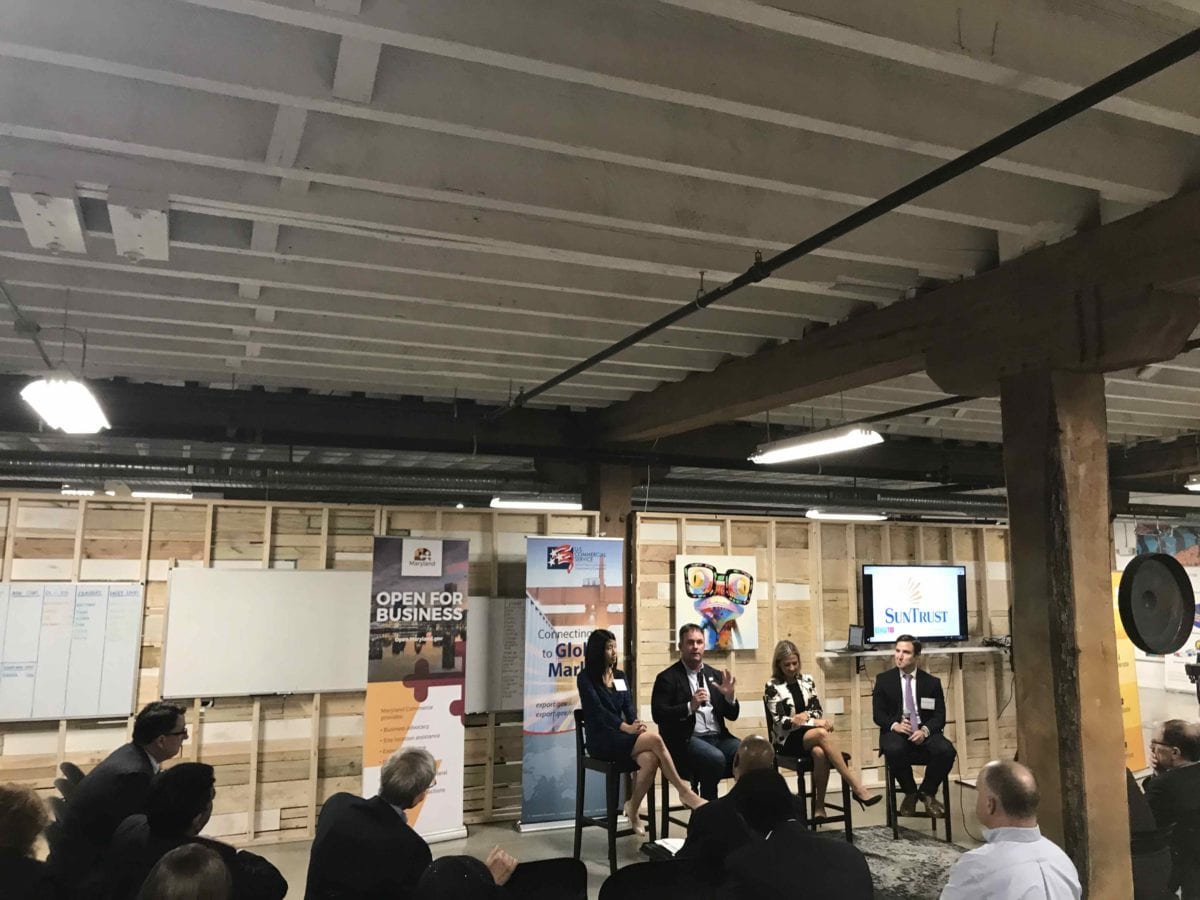Getting to the phase of expanding internationally is perhaps not the first milestone that a startup who is just beginning would think about. But in one sense, it’s part of a business’ journey from the start. After all, websites are accessible from anywhere, said Colleen Fisher of the U.S. Commercial Service.
“From the moment you are born you are a global company,” said Signe Pringle, Managing Director of the Maryland Department of Commerce Office of International Investment and Trade.
https://twitter.com/TechnicallyBMR/status/1050489673355812864
That idea was inherent throughout Startup Global, an event taking a worldwide view that was held on October 11 during Baltimore Innovation Week. Held at ETC’s Haven campus, the event brought together resources and ideas for young companies eying international markets through a series of panel discussions. Kicking off with remarks from Maryland Secretary of Commerce Mike Gill, the event was presented by the U.S. Commercial Service, Baltimore and Global Innovation Forum. During happy hour, attendees networked with organizations including Baltimore Sister Cities, Maryland Sister States, TEDCO and Export-Import Bank of the United States, among others.
Now that all companies are global, here are a few takeaways to consider from the panel:
Use free resources
When it comes to how businesses can work with government, there’s lots of talk about taxes and public-private partnerships.
But if the event was any indication, international expansion is perhaps one of the area’s where there’s a big opportunity for startups to tap into what the public sector has available.
Speakers on each of three panels at Startup Global spoke highly of the free resources that are available from the Maryland Department of Commerce and embassies to help a business as it seeks to expand. While the government can’t do business development, it can provide the information that assists entry to new places for companies that are also growing domestically.
During the day’s opening panel, Adashi Systems President Sanjay Kalasa told moderator Claire Pillsbury of Global Innovation Forum that these resources helped him to research the market as the company expanded its management platform for public safety agencies to countries such as Australia.
Among the companies who tapped into the Maryland Department of Commerce was Under Armour, said Matthew Stanton, who is the Baltimore apparel giant’s vice president of global public policy. The state and federal partners helped the company to understand trade issues, IP and more as it sought to expand deeper into countries such as China.
“There’s a legal strategy as you approach issues in China and then there’s people that understand the philosophy and the things that go behind it, and Commerce and the embassy was hugely helpful in helping us to understand those things,” Stanton said during the event’s closing panel, which included Pringle and Valerie Chua of the Singapore Economic Development Board.
For Christina Caraballo, a director at health IT firm Audacious Inquiry, linking with a local commercial specialist has helped with international expansion throughout her career.
Understand the local market
A key focus area in expanding is how a product will fit within a market. That’s true on a geographic level, panelists said, as different regions and countries require unique strategies.
For Under Armour, Stanton said the company’s strengths in running and basketball were a strong fit with China.
“You need to understand where you want to grow, how you want to grow and really understand where your technology is going to sell well,” he said.
For BTS Software Solutions President David Tohn, building strong local relationships is also key.
Considering what kind of team you might need to enter a market is also an important consideration, Tohn said. When seeking to hire, it’s also important to hire a person who can be a leader for that area.
The relationships can help when it comes to entering a market with established players.
“Having that representative that is your local advocate is extremely important,” Caraballo said. “Just because you’re not present in a market doesn’t mean you can’t figure out how to have representation there.”
The understanding also extends to how you communicate within those markets. Adashi’s Kalasa has learned that varying countries embrace specific communication tools. In Singapore, he found that people respond faster through WhatsApp.
https://twitter.com/TechnicallyBMR/status/1050466282225758208
Understand a country’s intellectual property and compliance regulations
When based in the U.S., many companies seek to comply with U.S. laws and regulations. But different countries take different approaches to these rules. The event featured a panel on navigating compliance and IP, featuring Under Armour’s first patent attorney Wesley Muller, Corinne Militello of the law firm Ballard Spahr and Alissa Starzak of web performance and security company Cloudflare.
When it comes to intellectual property, panelists stressed that rules can change. Militello said trademark regimes differ between countries. The same goes for security and compliance standards, said Starzak. That also means connecting with attorneys who understand those climates, said Muller.
“You’re going to need to obtain local counsel advice from the regions you enter,” Muller said.
Be aware of U.S. politics
Given tariffs that have been introduced and uncertainty around U.S. trade policies introduced by President Donald Trump, Caraballo has found the need to tailor specific conversations around how businesses continue to receive support to go global, and shifting the conversation around the problem a company is solving.
“In all of my travels last year, Trump has come up in every conversation,” Kalasa said.







